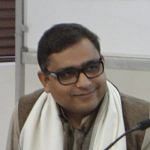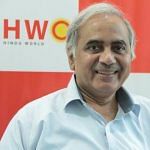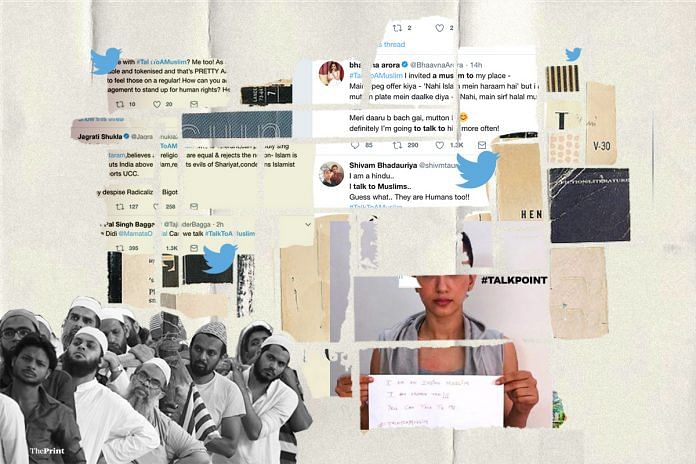The hashtag #TalkToAMuslim took Twitter by storm Tuesday. Social media influencers like Swara Bhasker, Gauhar Khan, and Rana Safvi tweeted with the hashtag which aims at defeating the current climate of hate and Islamophobia.
Critics believe that the campaign is facile and categorises all Muslims under the same umbrella.
ThePrint asks: Can hashtags like #TalkToAMuslim really help, or are they just a social media fad?
Those using hashtags never question the ordeal of Muslim women due to triple talaq and halala
 Vinit Goenka
Vinit Goenka
Former National Co-Convener of Information Technology Cell, BJP
#TalkToAMuslim is a non-issue hashtag and a mere social media fad. It is a blatant attempt by a few self-appointed vice-chancellors of morality on social media to alienate over 180 million Muslims brothers and sisters of India.
We are a nation of 1.3 billion people who speak nearly 122 languages and 1,600 dialects, practice seven major religions and our composite culture makes us into a nation. Be it company quartermaster havildar Abdul Hamid or rifleman Aurangzeb, our Muslim brothers have sacrificed their valuable lives for our motherland. With elections approaching, a deliberate attempt is being made to create political and social turmoil.
The same people have never asked the question why data on poverty shows a higher presence of Muslims in ‘persons below poverty line’ in spite of Congress ruling the country for more than 58 years directly or through coalitions. Not a word was said when Aurangzeb and Javed Ahmad Dar were brutally killed by terrorists in Kashmir.
It is important to note here that the biggest beneficiaries of several government schemes under PM Narendra Modi have been Muslim women. These include Swachh Bharat scheme, Ujjwala Yojna, and Beti Bachao Beti Padhao programmes. If these people trending hashtags are serious, they must speak about the ordeal of Muslim women due to triple talaq, halala and other such customs.
Let me quote Sant Kabir here as this is the true tradition of India.
काशी-काबा एक है, एकै राम रहीम।
मैदा इक पकवान बहु, बैठि कबीरा जीभ।।
Initiative should reach those who experience mobocracy on ground and not just be a twitter trend
 Hilal Ahmed
Hilal Ahmed
Associate professor, CSDS
‘Indian Muslim identity’ as a political construct is very different from the everyday social-cultural life of a common Muslim person.
The political identity is presented to us as a closed, standardised, homogeneous entity. We are told that there is only Islam, which is stridently followed by all those who describe themselves as Muslims; and by this logic, caste, class, gender, language and region do not play any role in determining the Muslimness of a Muslim. Hence, triple talaq, protection of Muslim personal law, Urdu, minority status of Aligarh Muslim University, and Babri Masjid are presented to us as exclusive manifestations of Muslimness in postcolonial India.
This dominant imagination of the Muslim identity fits very well with contemporary political ideologies. For instance, the Congress and other so-called ‘secular’ parties use the portrayal of pucca Musalman to nurture their ‘protection of minority’ agenda; while the BJP employs this Muslimness strategically to consolidate and strengthen its core Hindutva constituency. The media-driven politics of our time further reproduces these fixed Muslim images and we are left with a strange and somehow stupid question: Can a Muslim be an Indian?
In such a context, any initiative that emphasises the role of unmediated interactions between Muslim communities and people of other faiths (including those who do not have faith in any faith) must be appreciated. It would offer us an opportunity to look at the ways in which Muslimness is actually lived and experienced by a variety of Muslims in an overtly hostile anti-Muslim environment.
However, these initiatives should not be confined to the English language-dominated world of social media. There is a need to reach out to those Indian-Muslim as well as non-Muslims who encounter Hindutva-driven mobocracy at the grassroots level.
If hashtag ends up polarising social media further then it will fail its purpose
 Seshadri Chari
Seshadri Chari
Former editor, Organiser
Hashtags and Twitter are new age social media inventions that will remain in focus till newer technology is invented. But the need to understand one another, especially people from different faiths in a deeply polarised atmosphere, is constant.
There may be other hashtags more popular than #TalkToAMuslim, but the idea of bringing the subject into the public forum seems to have worked.
How we are treating Muslims in India needed to be talked about.
The mobile revolution has produced people who appear to be talking to themselves, earphones plugged in stylishly. This new hashtag has challenged us to be more serious in what we talk about.
There should be no cynicism about this hashtag if it about understanding one another. But if the idea of the hashtag #TalkToAMuslim ends up polarising the social media further, it
would have sadly lost its very purpose, presuming the purpose was a serious attempt at highlighting the need to act rather than be introverts in our own ghettos.
In any case, going by the posts in the social media, one thing is certain, we need training on being decent, polite and civilised while expressing our opinion.
The campaign, if not done as rhetoric, can show people that there is more to Muslims than Eid and sevaiya
 Apoorvanand
Apoorvanand
Hindi professor, Delhi University
#TalkToAMuslim campaign has been condemned for boxing all Muslims into a single category. It is said that Muslims, like any other community, are very diverse and it is impossible to tell exactly who a Muslim is. Do two Muslims necessarily identify with each other? Are there not diverse class or caste interests operating here? Can we even think of a single Muslim view to which all Muslims subscribe?
These are fair objections. But we need to understand that despite all the differences and diversities, there does exist a distinct Muslim identity. When writer and former MP Ehsan Jafri was dragged from his upmarket Gulbarg Society onto the streets and butchered he was not different from those labourers or traders who were burnt alive or raped.
Baroda professor J.S. Bandukwala escaped two attacks on him. His house was destroyed twice during anti-Muslim outbreaks of violence.
Secular and atheists bearing Muslim-sounding names experienced their Muslimness in a strange way in 1992 and 2002. Islamophobia was not created by Muslims. But it did create a ‘Muslimness’. There is no escape from it.
The Muslimness is thrust upon them in schools, public spaces, and occasions. Their own preference for a universal identity is irrelevant here.
So many modern, secular, atheist, non-practicing Muslims relearn or learned about their primary identity for the first time.
One would come across Muslims who have been denied a house because their names gave away their essential identity.
This campaign, if not done as a rhetoric, can become an occasion for ignorants to know that Eid, Muharram, Ramzan, sacrifice, sevaiya are definitely Muslim things, but there is so much more diversity to them.
To deny that there is a Muslim identity that is ignored is to behave like an ostrich.
As flabbergasting as it may sound, it’s time we make a conscious effort to #TalkToAMuslim
 Fatima Khan
Fatima Khan
Journalist, ThePrint
On Tuesday evening, the hashtag #TalkToAMuslim took over Twitter. Writer Rana Safvi was one of the first people to tweet using the hashtag.
“It immediately resonated with me. I instinctively picked it up the minute I saw it,” she told ThePrint.
Though many started using the hashtag, some were clearly taken aback by it. Is this what it has come down to, they ask. We now have to launch campaigns to speak to the Muslims around us, almost like they’re an exotic or alien people. This could just lead to even more otherisation of the community.
“We’ve been otherised for some time now. It is time we start thinking of ways to counter it. Communication becomes key in such times,” Safvi countered the critics.
It has, indeed, come down to that. If you already have Muslim friends, you should speak to them about their experiences. You might just be surprised at how many times Muslims are told things like “you are my first Muslim friend,” or “you don’t look like a Muslim”.
The key is to know more about the other from the mouth of the other- and not someone else’s perception of them. If the only intention of such conversations is to ascertain how they are different from us, it is futile and dangerous. Instead, such conversations must fuel introspection on how Muslims have been marginalised by the state and civil society.
The ‘Muslim experience’ is not a monolith. It is intertwined with the south Asian experience, a brown person’s experience. The activist effort must never forget that.
Compiled by Deeksha Bhardwaj, journalist at ThePrint.




talk to Muslim women – first then talk to fanatic Muslim who wears his 1500 year old outdated desert way of living on his sleeve – Muslim women are being put to slavery – married to the whole family raped by father in law , brother only in the name of isjam
This is people who don’t go out of there air condition life go out of ur cars take a walk on road u see people talk to people just as human not as Muslim Hindu minority majority,. Stop fighting election on social media for few chillar